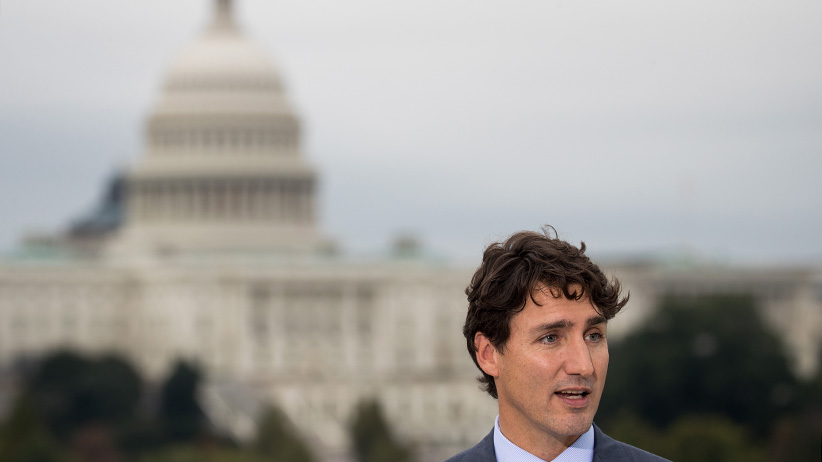Why 2018 is the year of the Trudeau reset
For all Trudeau’s activity on the home front, the NAFTA negotiations will determine his legacy
Prime Minister of Canada Justin Trudeau speaks during a press availability at the Canadian Embassy, October 11, 2017 in Washington, DC. Earlier in the day, Prime Minister Trudeau met with U.S. President Donald Trump, where their talks were expected to focus on the North American Free Trade Agreement (NAFTA). (Drew Angerer/Getty Images)
Share

They have their share of problems, but past their mid-mandate the Trudeau Liberals of 2018 are facing what could be called the “stale bread challenge.”
The Liberals cooked up so much policy in their first two years—extending CPP, a national price on carbon, a health care deal with the provinces, the tax-free child benefit, legalized pot, medically assisted death, a national housing strategy—that people forget what’s on the shelf. Before one of their policies settles in, they launch something new, pushing the old stuff to the back of the mantel. Their policy is starting to go stale well in advance of the best-before date, which just happens to be the next election.
READ: Why Trudeau will be his best advertisement—and worst enemy—in 2018
As columnist Andrew Coyne asked, how is it that this government gets no credit for a fast-growing economy? Partly it’s because people may no longer link economic growth to government action. It may also have to do with the government blowing through its election deficit promise to get things moving. Still, it’s hard to dismiss the idea that Liberals are so scattershot in their focus that the public can’t pin down exactly what’s been done.
It’s not uncommon to hear critics dismiss this government—one of the most activist in generations—as all about the selfies and style, as if there is no policy. The government is, in a sense, the victim of its own ambitions.
Nothing illustrates this better than Finance Minister Bill Morneau’s last-minute plan to lower the small-business tax. He hoped this would change the channel from the controversy swirling around his personal finances and the ethics commissioner’s examination into a potential conflict of interest on pensions. But Morneau’s big tax break, which will cost the government billions in lost tax revenues, was a blip not a bombshell. Before it even had a chance to grab some attention—and it may not have worked anyway—the government made a huge issue about peacekeeping. Then about ending the dependence on coal. Then the new pot regulations came down.
Bye-bye tax cuts, that was so… yesterday. Now the future of the finance minister is a big story to watch in 2018—whether there will be More-neau or Less-neau in cabinet is a real question, as he continues to be a drag on the Liberal brand.
In the next year, the government will have to decide whether to keep pumping out shiny new policy or slow down and reintroduce some of what they’ve already done. Bet on the latter: 2018 will be the year of re-announcements as the government tries to catch its breath and reset for 2019.
That won’t be easy. Some of the old files threaten to infest the political harvest. Profiles in Cannabis, the story of one Western leader’s great pot legalization experiment, will be one of those. Alongside an endless series of pot puns—to which, I must admit, I am sadly addicted—there will be highly contentious (okay, I’ll stop) debates about regulation, police busting private pot dispensaries, the movement to expunge past criminal records for pot possession, the dangers of driving under the influence and, finally, about where the big money collected from pot sales will actually go. While the world is watching to see how this unfolds, the government has more strategic concerns, wanting to get this issue off the front pages a year before the next election. Next year will be the dawn of Generation Weed.
It will also be the year of what pollster Nik Nanos calls “zombie NAFTA.” There is no other issue as important to the Canadian economy as the free trade accord. Its failure would shatter years of growth, but agreeing to a bad deal could be worse, devastating industries like auto in the face of American protectionism. NAFTA will likely define the Trudeau years as much as it did for Brian Mulroney. As the rounds of negotiations give way to increasing tension, the trade treaty is moving into a kind of half-life netherworld that will soon start to freeze investment as companies wait to see what will happen. Business does not like uncertainty.
The Trudeau government’s strategy is to hang in there, stay at the table while the hot rhetoric flies overhead. It hopes the voices of Congress, who understand the importance of free trade with Canada, will prevail over Trump’s tweets, and that a deal is struck that basically adheres to the broad outlines of the existing agreement, with a few exceptions. The government’s goal in 2018 will be to find a way to bring the zombie agreement back to life, instead of watching the slow shuffle to trade death.
Liberal governments historically run out of money before they run out of ideas. This government has been fortunate that economic growth has funded its activist ambitions while protecting its all-important debt-to-GDP ratio. But unless the Liberals slow down and let their ideas be seen, all their past policy will start to look stale. After all, retail politics these days too often comes down to one mean little question: what have you done for me lately?
Follow Evan Solomon on Twitter @EvanLSolomon
MORE ABOUT JUSTIN TRUDEAU:
- Why Justin Trudeau used the c-word—’colonialism’—in his apology
- Read Justin Trudeau’s apology to residential school survivors in Newfoundland
- What Canada and America owe Haiti
- Federal housing plan too vague on help for homeless veterans, say critics
- Justin Trudeau’s plan to make housing great again
- Why are flights in Canada so expensive?
- Trudeau, Notley say CFL’s Eskimos should discuss name change